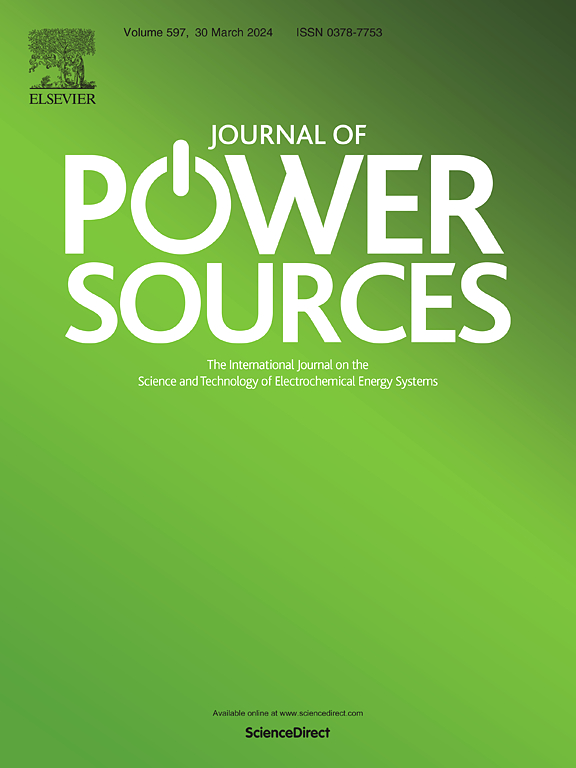压延工艺对硬碳电极力学性能及储钠机理的影响
IF 7.9
2区 工程技术
Q1 CHEMISTRY, PHYSICAL
引用次数: 0
摘要
压延是提高电池电极密度、提高能量密度和改善机械性能的重要步骤。本研究探讨了增量压延工艺对钠离子电池硬碳电极力学性能的影响及其储钠机理。为了分析电极的断裂和粘附失效行为,进行了拉伸和剥离试验,以检查压缩率与电极的机械强度以及涂层内粘附性之间的关系。通过膨胀实验,揭示了硬碳电极的储钠机理。结果表明:压缩率的提高提高了电极的力学性能和涂层与基体界面的结合强度,但降低了硬碳颗粒之间的内聚性;在高压实密度(2.74 g/cm3)条件下,高电压高原区硬碳电极的钠离子吸收率降低。本研究阐明了压延过程中结构致密化作用下硬碳电极断裂和钠离子输运机理,为优化钠离子电池硬碳电极制备工艺参数和协调控制提供参考。本文章由计算机程序翻译,如有差异,请以英文原文为准。

The influence of calendering process on the mechanical performance and sodium storage mechanism of hard carbon electrodes
Calendering is an important step to densify the battery electrodes, enhance energy density, and improve mechanical properties. This study explores the effects of incremental calendering on the mechanical performance and sodium storage mechanism of hard carbon electrodes for sodium-ion batteries. In order to analyze the fracture and adhesion failure behavior of the electrode, tensile and peeling tests are performed to examine the relationship between the compression rate and the mechanical strength of the electrode as well as the adherence within the coating. Through expansion experiments, the sodium storage mechanism of the hard carbon electrode is revealed. The results indicate that increasing the compression rate enhances the electrode's mechanical properties and the adhesion strength at the coating-substrate interface, but reduces the cohesion between hard carbon particles. Under conditions of high compacted density (2.74 g/cm3), the sodium ion absorption rate of the hard carbon electrode in the high voltage plateau region is diminished. This research clarifies the fracture and sodium ion transport mechanisms of hard carbon electrodes under the action of structure densification during calendaring, providing a reference for optimizing the preparation process parameters of hard carbon electrodes in sodium-ion batteries and for coordinated control.
求助全文
通过发布文献求助,成功后即可免费获取论文全文。
去求助
来源期刊

Journal of Power Sources
工程技术-电化学
CiteScore
16.40
自引率
6.50%
发文量
1249
审稿时长
36 days
期刊介绍:
The Journal of Power Sources is a publication catering to researchers and technologists interested in various aspects of the science, technology, and applications of electrochemical power sources. It covers original research and reviews on primary and secondary batteries, fuel cells, supercapacitors, and photo-electrochemical cells.
Topics considered include the research, development and applications of nanomaterials and novel componentry for these devices. Examples of applications of these electrochemical power sources include:
• Portable electronics
• Electric and Hybrid Electric Vehicles
• Uninterruptible Power Supply (UPS) systems
• Storage of renewable energy
• Satellites and deep space probes
• Boats and ships, drones and aircrafts
• Wearable energy storage systems
 求助内容:
求助内容: 应助结果提醒方式:
应助结果提醒方式:


